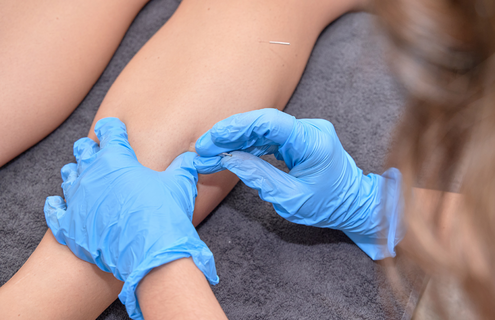
Do I need dry needling or acupuncture? It’s easy to search for information online, but it’s smarter to ask the experts. APD’s physical therapy and integrative medicine providers explain the difference, the similarities, why you would need one over the other, and when you might need both.
What is dry needling?
According to the American Institute of Alternative Medicine, dry needling is a form of Western Medicine primarily used to treat musculoskeletal pain and dysfunction by penetrating trigger points in the muscles, tendons, and ligaments.
What is acupuncture?
“Acupuncture is one tool within the rich system of Chinese and Asian medicine. It is the placing of small, solid acupuncture needles into specific locations on the body to improve the flow of energy and blood. Improving energy and blood flow in the body relieves pain and improves mobility,” said Cindy Reuter, ND, LAc, RD, MSOM, MPH, Medical Director of Integrative Medicine at APD. “We also see improvements in sleep, mood, energy and organ function. Acupuncture also stimulates the brain to make feel-good and anti-pain chemicals.”
What are the benefits of dry needling?
Dry needling treats chronic pain, headaches, and muscle strain. Dry needling has been shown to reset the muscles on a structural, biochemical, and electrical level. Dry needling can help treat chronic pain, headaches, and muscle strain by increasing blood flow, increasing range of motion, and improving muscle activation or function.
What are the benefits of acupuncture?
“Acupuncture is part of a millennia-old system of medicine, and when you see an acupuncturist you are tapping into that knowledge and plus a whole toolkit to help,” Reuter said. “I treat a lot of chronic pain with acupuncture. Because I bring multiple tools to the patient’s care, I see their pain get better and very often other health issues improve as well, including mood, sleep, energy and digestion. With acupuncture we are addressing pain and their health issues at their root cause which gives people the best chance at deeper, longer-lasting healing.”
Will dry needling (or acupuncture) alone help?
“Dry needling is another tool to help remediate or lessen someone’s pain. It is usually combined with strengthening and manual techniques,” said Kirsten Eastman, manager of Rehabilitation and Occupational Health at APD.
Acupuncture also incorporates other modalities. “When patients see me for acupuncture, they get the benefit of all the ways I can help them. We can address their pain and health issues with acupuncture, Chinese herbs, naturopathic medicine, functional medicine, nutrition, energy healing and mindfulness,” said Reuter.
Which one do I choose, and when?
Ask your primary care or specialty care provider for a recommendation. In general, if your symptoms are musculoskeletal (an injury to the bones, muscles, nerves or joints) in nature, consider dry needling.
If you think there might be an underlying systemic component, perhaps combined with musculoskeletal, consider acupuncture.
You can also do both. A physical therapist and acupuncturist can work together to tackle a musculoskeletal component and an underlying system component.
Do I need a referral for either treatment?
A doctor will refer you to a physical therapist with dry needling certification if you have a musculoskeletal issue causing pain or distraction.
You do not need a doctor referral to see an acupuncturist. “We welcome referrals from primary and specialty care providers but people can also self-refer,” Reuter said.
What should you look for in a provider?
Check your state to make sure the practice is legal (dry needling is allowed in New Hampshire and Vermont). Then choose a provider who has been trained and certified in dry needling. The credential provides hands-on training in dry needling techniques and safety.
You’ll want to look for a board-certified acupuncturist. According to the National Certification Commission for Acupuncture and Oriental Medicine, nearly all states require licensed acupuncturists to pass national board certification exams. The additional designation of licensed acupuncturist (LAc) is awarded by a state regulatory board.
Alice Peck Day Memorial Hospital offers physical therapists credentialed in dry needling and a licensed acupuncturist.